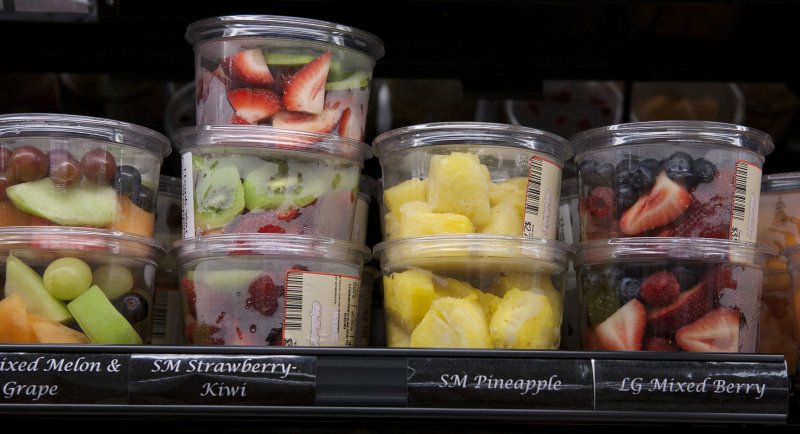Packaged prepared fruit containers. UPI/Gary C. Caskey |
License Photo
TEMPE, Ariz., April 24 (UPI) -- Heating leftovers in the office microwave can leave possible toxins in the food and cold spots that harbor bacteria, a U.S. expert says.
Rolf Halden, the director for the Center for Environmental Security at the Biodesign Institute at Arizona State University, said the level of chemicals leaching into food while being reheated in the microwave depends on the type of plastic put in the microwave, the time it is heated and the physical condition of the container, The Wall Street Journal reported.
"We don't know if and how many people die from plastic exposure, but we do know that in the developed world we suffer from a lot of diseases -- breast cancer, obesity and early onset puberty -- that are less prevalent in developing countries," Halden told the Journal. "These are a result of our lifestyle. From a public health perspective, we should consider heated plastic an unnecessary source of exposure to harmful elements and eliminate it."
Halden, who has done studies on emerging contaminants and plastics for more than a decade, said phthalates can leach into food, resulting in hormone imbalances and birth defects -- but no one knows at what level those effects are triggered.
Bisphenol A is potentially worse. Used in everything from the lining of metal soup cans to receipt paper, BPA was banned from baby bottles by the U.S. Food and Drug Administration but other exposure continues.
Old, cracked plastic containers and those washed hundreds of times often give off more toxins when heated, Halden said.
Instead of plastic, Halden suggested using glass or ceramic for microwave heating, or better yet, avoid the the hot and cold spots of microwave reheating and use an oven or the stove.















